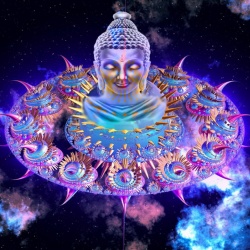Difference between revisions of "Ghoshila"
(Created page with "thumb|250px| Ghoshila; 瞿師羅; (Skt; Pali Ghosita; Jpn Kushira); A wealthy man in Kaushambi, India, who became a foll...") |
|||
| Line 1: | Line 1: | ||
[[File:Starsstoned.jpg|thumb|250px|]] | [[File:Starsstoned.jpg|thumb|250px|]] | ||
| − | [[Ghoshila]]; [[瞿師羅]]; (Skt; [[Pali]] [[Ghosita]]; Jpn [[Kushira]]); A wealthy man in [[Kaushambi]], [[India]], who became a follower of [[Shakyamuni Buddha]]. He built a [[monastery]] in a grove that he owned, and [[offered]] both the [[monastery]] and grove to the [[Buddha]]. They were named [[Ghoshila Grove]] and [[Ghoshila Monastery]]. According to the [[Buddha's]] | + | [[Ghoshila]]; [[瞿師羅]]; (Skt; [[Pali]] [[Ghosita]]; Jpn [[Kushira]]); A wealthy man in [[Kaushambi]], [[India]], who became a follower of [[Shakyamuni Buddha]]. He built a [[monastery]] in a grove that he owned, and [[offered]] both the [[monastery]] and grove to the [[Buddha]]. They were named [[Ghoshila Grove]] and [[Ghoshila Monastery]]. According to the [[Buddha's]] [[Preaching Life Sutra]], five hundred [[Brahmans]] met [[Ghoshila]] on their way to [[Shravasti]] to see [[Sudatta]], a wealthy {{Wiki|merchant}} and the [[Buddha's]] {{Wiki|patron}}, and [[Ghoshila]], who also wanted to see [[Sudatta]], traveled with them. When they arrived in [[Shravasti]] and met [[Sudatta]], he was on his way to see [[Shakyamuni Buddha]] at [[Jetavana Monastery]]. |
| − | They accompanied [[Sudatta]] to the [[monastery]], where they saw the [[Buddha]]. Hearing the [[Buddha]] {{Wiki|preach}}, the five hundred [[Brahmans]] [[attained]] the stage of [[non-returner]], the level directly below the stage of [[arhat]], while [[Ghoshila]] obtained the [[Dharma]] eye.Ghoshila wanted to invite [[Shakyamuni]] to [[Kaushambi]], so he converted one of his residences into a [[monastery]] so that the [[Buddha]] could stay there and {{Wiki|preach}}. The story of the five hundred [[Brahmans]] and [[Ghoshila]], who [[attained]] [[insight]] after hearing [[Shakyamuni]] {{Wiki|preach}}, is found also in the Stories of the [[Words of Truth Sutra]]. This [[sutra]], however, does not mention [[Ghoshila's]] [[desire]] to invite [[Shakyamuni]] to | + | They accompanied [[Sudatta]] to the [[monastery]], where they saw the [[Buddha]]. Hearing the [[Buddha]] {{Wiki|preach}}, the five hundred [[Brahmans]] [[attained]] the stage of [[non-returner]], the level directly below the stage of [[arhat]], while [[Ghoshila]] obtained the [[Dharma]] eye.Ghoshila wanted to invite [[Shakyamuni]] to [[Kaushambi]], so he converted one of his residences into a [[monastery]] so that the [[Buddha]] could stay there and {{Wiki|preach}}. The story of the five hundred [[Brahmans]] and [[Ghoshila]], who [[attained]] [[insight]] after hearing [[Shakyamuni]] {{Wiki|preach}}, is found also in the Stories of the [[Words of Truth Sutra]]. This [[sutra]], however, does not mention [[Ghoshila's]] [[desire]] to invite [[Shakyamuni]] to [[Kaushambi]] or his grove and [[monastery]]. In {{Wiki|Chinese}} [[Buddhist scriptures]], including the {{Wiki|Chinese}} translation of the Stories of the [[Words of Truth Sutra]], Ghoshila's [[name]] is rendered as "[[Beautiful Sound]]." According to The [[Record of the Western Regions]], when its author, [[Hsüan-tsang]], visited [[Kaushambi]] in the first half of the seventh century, the [[monastery]] built by [[Ghoshila]] and a [[stupa]] erected by [[King Ashoka]] on its compound were still [[standing]]. [[Hsüan-tsang]] says that [[Shakyamuni]] [[preached]] there for several years. |
{{R}} | {{R}} | ||
[http://www.sgilibrary.org/search_dict.php www.sgilibrary.org] | [http://www.sgilibrary.org/search_dict.php www.sgilibrary.org] | ||
[[Category:Buddha Shakyamuni]] | [[Category:Buddha Shakyamuni]] | ||
Latest revision as of 05:10, 17 April 2014
Ghoshila; 瞿師羅; (Skt; Pali Ghosita; Jpn Kushira); A wealthy man in Kaushambi, India, who became a follower of Shakyamuni Buddha. He built a monastery in a grove that he owned, and offered both the monastery and grove to the Buddha. They were named Ghoshila Grove and Ghoshila Monastery. According to the Buddha's Preaching Life Sutra, five hundred Brahmans met Ghoshila on their way to Shravasti to see Sudatta, a wealthy merchant and the Buddha's patron, and Ghoshila, who also wanted to see Sudatta, traveled with them. When they arrived in Shravasti and met Sudatta, he was on his way to see Shakyamuni Buddha at Jetavana Monastery.
They accompanied Sudatta to the monastery, where they saw the Buddha. Hearing the Buddha preach, the five hundred Brahmans attained the stage of non-returner, the level directly below the stage of arhat, while Ghoshila obtained the Dharma eye.Ghoshila wanted to invite Shakyamuni to Kaushambi, so he converted one of his residences into a monastery so that the Buddha could stay there and preach. The story of the five hundred Brahmans and Ghoshila, who attained insight after hearing Shakyamuni preach, is found also in the Stories of the Words of Truth Sutra. This sutra, however, does not mention Ghoshila's desire to invite Shakyamuni to Kaushambi or his grove and monastery. In Chinese Buddhist scriptures, including the Chinese translation of the Stories of the Words of Truth Sutra, Ghoshila's name is rendered as "Beautiful Sound." According to The Record of the Western Regions, when its author, Hsüan-tsang, visited Kaushambi in the first half of the seventh century, the monastery built by Ghoshila and a stupa erected by King Ashoka on its compound were still standing. Hsüan-tsang says that Shakyamuni preached there for several years.
